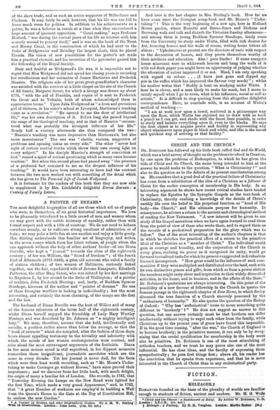A PAINTER OF DREAMS.*
THE most delightful biographies of all are those which tell us of people who were, in themselves, of no great historical importance. We love to be pleasantly introduced to a little crowd of men and women whom we may greet with the subtle intimaey of equality, rather than with formal respect and with a title of courtesy. We do not need to behave ourselves seemly, or to cultivate strong emotions of admiration or of hate ; we may poke a little fun at one another and enjoy a little gossip. Mrs. Stirling understands this familiar art of biography, and writes, in the seven essays which form her latest volume, of people whom she can approach without the help of other authors' books—of one Diana Bosville, who kept a " journal " towards the close of the eighteenth century ; of her son William, the "friend of freedom " ; of the fourth Earl of Albemarle (1772-1849), a grim old autocrat who ruled a family of sixteen children ; of two women of Baltimore, curiously linked together, one the fair, repudiated wife of Jerome Bonaparte, Elizabeth Patterson, the other Mary Caton, who was related by her first marriage to Napoleon I., by her second to the Duke of Wellington ; of a painter of realities, John Frederick Herring ; and, lastly, of Roddam Spencer.
Stanhope, kinsman of the author and "painter of dreams." No one of these Georgian worthies is lacking in individuality ; but the most interesting, and certainly the most charming, of the essays are the first and the last.
The husband of Diana Bosville was the host of Wilkes arid of many of the famous reformers of the latter half of the eighteenth century. whilst Diana herself enjoyed the friendship of Lady Mary Wortley Montagu and was described by Dr. Johnson as "a mighty intelligent lady." We may, therefore, assume that she held, intellectually and socially, a position rather above than below the average, so that the "book of extracts" which she compiled, after the fashion of those days, bears almost appalling testimony to the triviality and inferiority with which the minds of her women contemporaries were content, and cries aloud the most extravagant arguments of the feminists. Diana in her most serious mood is still superficial, in her flippant moments transcribes those insignificant, journalistic anecdotes which are the same in every decade. Yet her journal is never dull, for the facts which were then least worth recording, such as "Mr. Moore's Under- taking to make Carriages go without Horses," have since proved their importance ; and we discover from her little book, with much delight, the origin of many a familiar bit of London. She records, in 1763, that
"Yesterday Evening the Lamps on the New Road were lighted for the first Time, which made a very grand Appearance," and, in 1762, that "A great Number of workmen are employ'd in building a Wall from the Queen's House to the Gate at the Top of Constitution Hill, to enclose the now Garden."
• d Painter 01 Dreams, and other Biographical Stadia.. By A. AL 171. 24141111g. . Lennon ; Sohn Lane. Ll2s. ed. not,1 And here is the last chapter in Mrs. Stirling's book. How far we have come since the Georgian scrap-book and Mr. Moore's " Under- taking " ! This is the very beginning of a new age, here in Holland House garden, where Rossetti and Burne-Jones and Dickens and Browning walk and talk and disturb the Victorian Sunday afternoons— and among them is young Roddam Spencer Stanhope, lately come from the University to study under Watts, filled with rich desires for Art, frescoing houses and the walls of rooms, writing home letters all ablaze : "Upholsterers at present .arc the directors of taste with respect to the decoration of houses, and they prove themselves worthy of their intellects and education. Alas poor Snobs I If some energetic; house miscreant were to whitewash heaven and hang the walls of it with red-flock paper you might have an opportunity of judging whether the alteration of colour improved it or not. Mind, I am only speaking with regard to colour. . . .(I have just gone and dipped my pen in the coffee which has improved the flavour very much) " ; whilst his mother writes that "Roddy is bent on studying under Watts. I hear he is clever, and a man likely to make his mark, but I mean to satisfy myself when I go to town, what is his influence, moral as well as artistic." It is difficult to stop quoting from this altogether delightful correspondence. Here, to conclude with, is an account of Watts's method of teaching :— " I am at work now upon a towel, scattered in a picturesque way upon the floor, which Watts has enjoined me to draw with as hard a pencil as I can get, and shade with the finest lines possible, in order to study and imitate everything upon it, even to the blacks. He says the first object is to acquire power and facility in representing any object whatsoever upon paper in black and white, and this is the surest and quickest way of arriving at that facility."






























 Previous page
Previous page